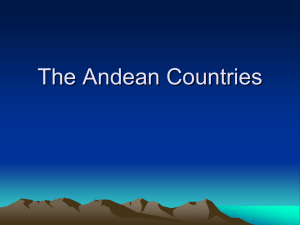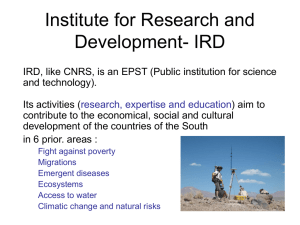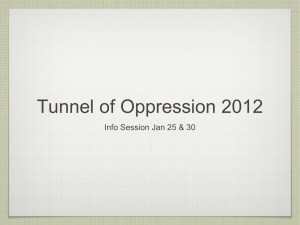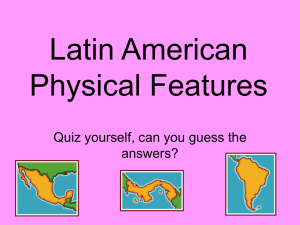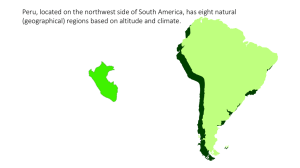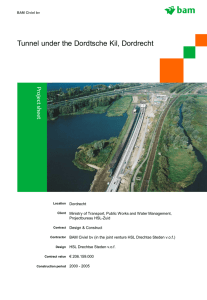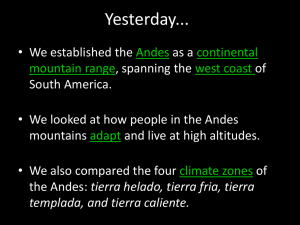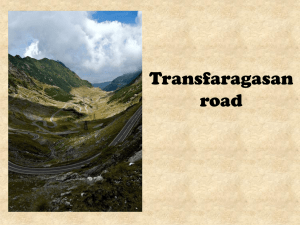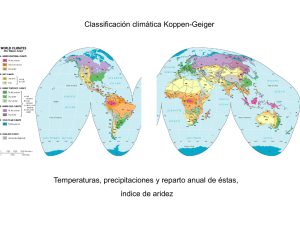ANDES *Agua Negra Deep Experiment Site*
advertisement
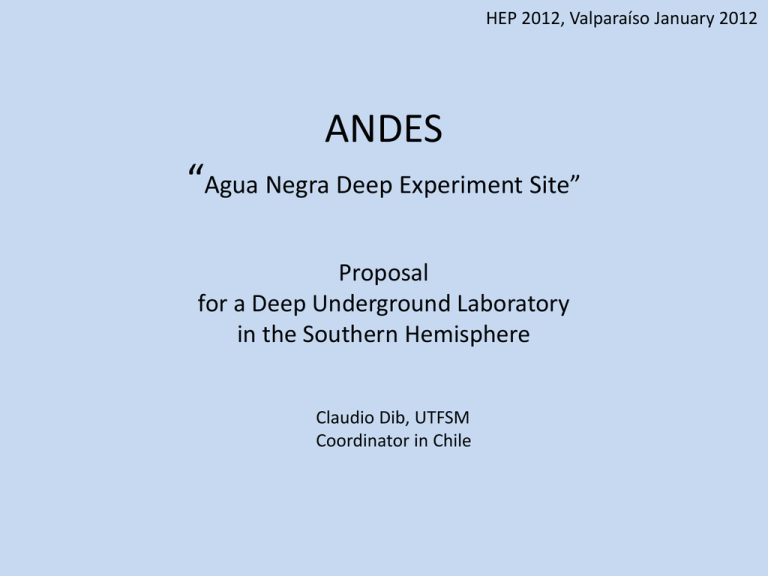
HEP 2012, Valparaíso January 2012 ANDES “Agua Negra Deep Experiment Site” Proposal for a Deep Underground Laboratory in the Southern Hemisphere Claudio Dib, UTFSM Coordinator in Chile The proposal: • To build an Underground Lab in the AGUA NEGRA tunnel. The AGUA NEGRA tunnel will be built under the Andes Mountains between Chile and Argentina. The Agua Negra Tunnel There is no Tunnel yet! Views of the Agua Negra pass The Tunnel Proposal • Why a tunnel: - growing trade between Argentina and Brazil with Asia. • Shipping through Chilean ports to cross the Andes. • The mountain passes suffer severe cuts in winter. • Tunnel alternatives: – Agua Negra pass (Coquimbo – San Juan) ~ 14 km – Aconcagua pass (Los Andes – Mendoza) ~ 50 km – Las Leñas pass (Rancagua – Mendoza) ~ 12 km Maps The Tunnel proposal • Double Tunnel between Chile and Argentina 4th Region (Chile) – San Juan Province (Argentina) • Diameter: 12 m (two lanes each). • Length: 14 km. • Parallel separation: > 60 m; Connections every 500 m. The Tunnel proposal • • • • • Altitude: 3600 m asl (Chile) – 4085 m asl (Argentina) T = 30 – 40 Celsius Construction: 2013 - 2020 Cost: 850 MUSD app. Ventilation (forced longitudinal and transverse): 14,5 MW Agua Negra geology Rock studies Main rock: - Andesite variations: - rhyolite - basalt - dacite - trachyte 9 samples from 8 perforations up to 600 m deep Andesite Basalt Rhyolite 1 Rhyolite 2 U-238 9.2 ± 0.9 2.6 ± 0.5 14.7 ± 2.0 11.5 ± 1.3 Th-232 5.2 ± 0.5 0.94 ± 0.09 4.5 ± 0.4 4.8 ± 0.5 K-40 47 ± 3 50 ± 3 57 ± 3 52 ± 3 Thanks to Laboratorio de Activación Neutrónica (Bariloche, Argentina) Bq/kg ANDES: an underground Laboratory in South America Deep underground Laboratories in the world + China, Korea, India (not shown in the map) None in the Southern Hemisphere Southern Hemisphere and Latin America: • South Africa: neutrino detection in gold mines (1965…) • South America: - Brazil: search for a mine by C. Lattes. - Argentina: Dark Matter search experiment at Sierra Grande mine (1000 mwe). - Chile: El Teniente mine prospected (2001). • Mexico: Multidisciplinary Mexican Underground Laboratory (LSMM) proposal 2006. World Labs: Muon flux vs. depth Flux at sea level ~ 100 /m2 s ANDES depth: ~ 4500 – 4800 mwe The ANDES Lab proposal • Take advantage of the construction of a deep tunnel (unique opportunity for U-Lab) • U-Lab at the deepest point in tunnel (~ 1750 m deep) • 3.5 km to Chilean entrance, 10 km to Argentinean entrance Support Labs • Support Lab on each side: tentative: Vicuña (Chile) , San José de Jáchal (Argentina) ~ 140 km ~ 130 km Support Lab U- Lab Support Lab Nearest towns In Argentina: In Chile: Las Flores (75 km) 900 hab. Paiguano (135 km) 4.000 habs. Rodeo (90 km) 2.400 hab. Vicuña (150 km) 24.000 habs. San José de J. (140 km) 11.000 hb. Offices at entrances Tunnel will have a portal on each side, with local services. • Ask for 1 or 2 ANDES offices on each side • Possible night sleep to avoid daily trip to support labs. What makes ANDES special? • Third deepest Lab in the world. • Only deep underground lab in southern hemisphere • Opposite weather-induced modulations • Low reactor neutrino bkg – Embalse: 2.1 GWt, 560 km – Atucha: 1.2 GWt, 1080 km – Atucha II: 2.1 GWt • Geoactive Region – Geophysics experiments • Very long baselines: – CERN: 9920 km – Fermilab: 7640 km (magic baseline) – KEK: 12400 km (1500 km from earth center) ANDES initial Scientific Programme • Neutrino physics: - host double beta decay experiments - large Latin American neutrino detector - KamLAND / Borexino style - focus on low energy - Solar / Supernova / Geo neutrinos • Dark Matter - modulation measurements - new technologies • Geophysics - link Chile-Argentina seismograph networks • Biology - life in extreme and low radiation environments • Low background intrumentation and measurements ANDES Lab concept Located on southern side, near km 4 Main hall: 21 x 23 x 50 m3 Secondary hall: 16 x 14 x 40 m3 Multilevel hall: 17 x 15 x 25 m3 on 3 floors (up to 1200 m2) Ultra low radiation pit: 8m , 9m depth Single experiment pit: 30m , 30m depth Linear tunnel for interferometers. ANDES Lab concept Ultra low radiation pit Multipurpose Hall Main Hall Estimated civil work cost (total Lab): 15 MU$D Organization: Consorcio Latinoamericano de Estudios Subterráneos (CLES ) Latin American Consortium for Underground Studies CLES (Latin American Consortium for Underground Studies • CLES forms the Scientific Committee to manage the ANDES Laboratory. • Common participation for ANDES operation and operating funds. • Excellent opportunity to have an international Laboratory, not only international experiments. • CLES: our seed for a small CERN-like organization with focus on all underground sciences (HEP, Geophysics, Biology, etc…) Expressed interest for ANDES • Letters of support from scientists/collaborations (LNBE, SNOLAB, KamLAND, RCNP, SuperK, ICRR,…) • Letters of interest/coll. Proposals (SuperNEMO, MIMAC, COBRA, DAEDALUS, ORNL,…) ANDES Workshops • • • • First: April 2011, Buenos Aires Second: June 2011, Rio de Janeiro Third: tomorrow, here. Fourth: June 2012, Mexico…? People • Country representatives: – – – – – Coordinator: Xavier Bertou Argentina: Osvaldo Civitarese Brazil: Ronald C. Shellard Chile: Claudio Dib Mexico: Juan Carlos D’Olivo • Science Task Forces: – – – – Neutrinos: Renata Z. Funchal Dark Matter Geophysics Other… Conclusions • • • • • Tunnel under the Andes Mts.: unique opportunity for a Deep U-Lab First deep underground lab in Southern Hemisphere Unique Latitude, distance to centres and position on earth crust CLES: Opportunity for a Latin American Science integration Project status: – – – – – – Scientific support, political support First conceptual pre-designs of the Lab Some proposals for experiments Favorable reception to include Lab in Tunnel Some rock studies, lab feasibility study still pending Getting better everyday, but much more work ahead… • More info at http://andeslab.org Thank you!
